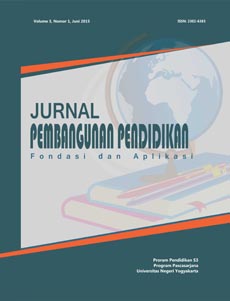Studi komparatif reformasi pendidikan di Singapura dan Indonesia
DOI:
https://doi.org/10.21831/jppfa.v7i1.25273Keywords:
Desentralisasi pendidikan, mutu pendidikan, reformasi pendidikan, educational decentralization, quality of education, educational reformsAbstract
Perubahan zaman menuju era globalisasi menuntut dunia pendidikan untuk berkiprah secara aktif mempersiapkan generasi muda dalam menyongsong tantangan zaman. Kerangka pendidikan yang selama ini diterapkan juga harus beradaptasi dengan tuntutan zaman. Dalam menghadapi tantangan ini, sejumlah Negara telah menginisiasi diberlakukannya reformasi pendidikan. Artikel ini membahas tentang program-program refomasi pendidikan di dua Negara dengan latar belakang dan kondisi serta ideologi yang berbeda yaitu Singapura dan Indonesia. Diantara program refomasi pendidikan di Singapura adalah Teach less, Learn More; Thinking School, Learning Nation, dan School Excellent Model. Sedangkan kebijakan refeormasi pendidikan di Indonesia diantaranya diselenggarakan dengan desentralisasi pendidikan dalam kerangka manajemen berbasis sekolah, Kurikulum Tingkat Satuan Pendidikan dan Kurikulum 2013, serta program sertifikasi guru. Dari hasil pembahasan, dapat diketahui bahwa Singapura telah berhasil menyelenggarakan reformasi pendidikan. Hal ini dapat dilihat dari kualitas pendidikan Singapura yang masuk dalam ranking teratas Negara-negara dengan pencapaian standar pendidikan internasional. Sementara itu, Indonesia nampak masih harus berjuang untuk mencapai tujuan reformasi pendidikan. Hasil implementasi pendidikan yang berbeda di kedua Negara ini tentu dikarenakan perbedaan latar belakang, serta kondisi sosial, ekonomi, politik budaya dan geografis kedua Negara tersebut. Dengan demikian, dapat disimpulkan bahwa banyak factor yang mempengaruhi keberhasilan penyelengaraan reformasi pendidikan di sebuah Negara.
Abstract
Globalization requires education to actively take part in preparing the young generation to face the challenges. The educational framework which has been implemented should also adapt to the existing new challenges. To deal with this, a number of countries have initiated the implementation of educational reform. This article discusses educational reformation programs conducted in two countries which have a different background as well as different ideology, social, economic, political, and geographical circumstances i.e., Singapore and Indonesia. Some of the main educational reform agendas in Singapore are Teach less, Learn More; Thinking School, Learning Nation, and School Excellent Model. Meanwhile, educational reform programs in Indonesia are conducted through educational decentralization within the framework of school-based management, School-level Curriculum, and the 2013 curriculum and teacher certification. It can be understood that Singapore has succeeded in conducting educational reform. This can be seen from the quality of Singapore's education which has been ranked high in achieving the benchmark of international education standard. Meanwhile, Indonesia still needs to struggle to achieve the desired outcomes of educational reform agendas. The differing result of educational reform revealed in these two countries resulted from different backgrounds of the countries. Thus, it can be concluded that there are a number of factors influencing the success of educational reform agendas in a country.
References
Baswedan, A. R. (2014, December). Gawat darurat pendidikan di Indonesia. A paper presented at the meeting between Ministry and Head of Education Offices Indonesia, Jakarta, Indonesia.
Bjork, C. (2004). Decentralization in education, institutional culture and teacher autonomy in Indonesia. International Review Of Education, 50, 245-262. Doi: https://doi.org/10.1007/s11159-004-2622-6
Bjork, C. (2006). Transferring authority to local school communities in Indonesia: Ambitious plans, mixed results. Educational Decentralization, 129-147. Doi: https://doi.org/10.1007/978-1-4020-4358-1_9
Firman, H., & Tola, B. (2008). The future of schooling in Indonesia. Journal of International Cooperation in Education, 11(1), 71-84.
Kadir, M. A. A. (2009). Rethinking thinking schools, learning nation: Teachers' and students' perspective of critical thinking in Singaporean education (Unpublished doctoral dissertation). The University of Melbourne, Melbourne.
Koh, A. (2007). Living with globalization tactically: The metapragmatics of globalization in Singapore. Sojourn: Journal of Social Issues in Southeast Asia, 22(2), 179-201. Doi: https://doi.org/10.1355/SJ22-2B
Lee, S. S., Hung, D., & Teh, L. W. (2013). Moving Singapore from great to excellent: How educational research informs this shift. KEDI Journal of Educational Policy, 10(2), 267-291.
Low, E. L. (2011). Paving the fourth way: The Singapore story. Singapore: Natinal Institution of Education.
Manning, C. (2000). The economic crisis and child labor in Indonesia. ILO/IPEC Working Paper, 14-34. Doi: https://doi.org/10.1.1.200.9831
Ministry of Education Singapore. (1997). Towards Thinking Schools. Singapore: Ministry of Education Singapore.
Ministry of Education Singapore. (2000). The school excellence model: A guide. Singapore: The school appraisal branch, schools division. Singapore: Ministry of Education Singapore.
Mok, K. H. (2008). Positioning as a regional hub of higher education: Changing governance and regulatory reforms in Singapore and Malaysia. International Journal of Educational Reform, 17(3), 230-250. Doi: https://doi.org/10.1177/105678790801700303
Moleog, L., J. (2007). Metodologi penelitian kualitatif. Bandung: Remaja Rosdakarya.
Nazir, M. (1988). Metode penelitian. Jakarta: Ghalia Indonesia.
Ng, P. T. (2017). Learning from Singapore: The power of paradoxes. Taylor & Francis.
Sugiyono, S. (2018). Metode penelitian kuantitatif, kualitatif, dan R&D. Bandung: Alfabeta.
Tan, J., & Gopinathan, S. (2010). Education reform in Singapore: Towards greater creativity and innovation?. NIRA Review, 7(3), 5-10.
Tee Ng, P., & Chan, D. (2008). A comparative study of Singapore's school excellence model with Hong Kong's school"based management. International Journal of Educational Management, 22(6), 488–505. Doi: https://doi.org/10.1108/09513540810895426
Tee Ng, P., & Tan, C. (2010). The Singapore global schoolhouse: An analysis of the development of the tertiary education landscape in Singapore. International Journal of Educational Management, 24(3), 178–188. Doi: https://doi.org/10.1108/09513541011031556
World Bank. (2008). World development indicators database. Retrieved from http://www.siteresources.worldbank.org/ DATASTATISTICS/
Yeom, M., Acedo, C., & Utomo, E. (2002). The reform of secondary education in Indonesia during the 1990s: Basic education expansion and quality improvement through curriculum decentralization. Asia Pacific Education Review, 3(1), 56–68. Doi: https://doi.org/10.1007/BF03024921
Downloads
Published
How to Cite
Issue
Section
Citation Check
License
The Authors submitting a manuscript do so on the understanding that if accepted for publication, copyright publishing of the article shall be assigned to Jurnal Pembangunan Pendidikan: Fondasi dan Aplikasi
 | Jurnal Pembangunan Pendidikan: Fondasi dan Aplikasi by https://journal.uny.ac.id/index.php/jppfa is licensed under a Creative Commons Attribution-ShareAlike 4.0 International License. |














